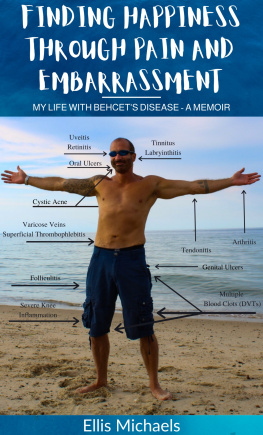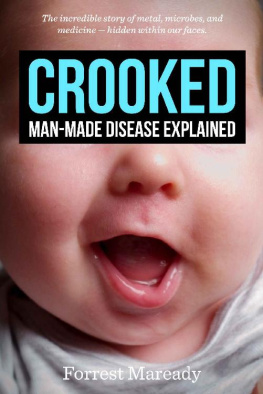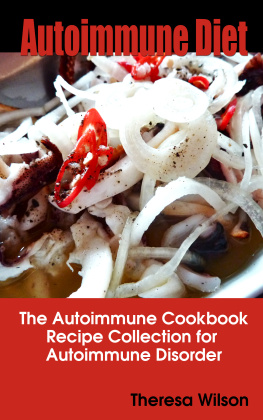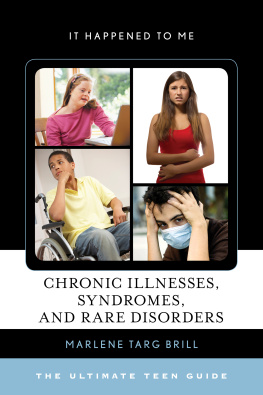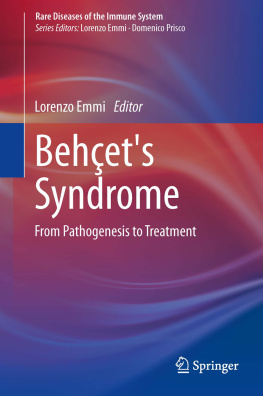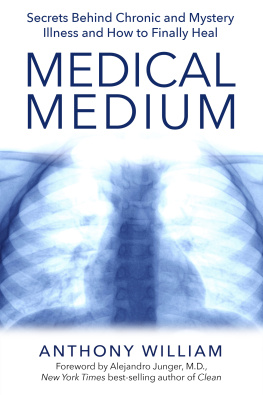Contents
Finding Happiness Through Pain And Embarrassment
My Life With Behcets Disease - A Memoir
by Ellis Michaels
SOME NAMES HAVE BEEN CHANGED TO PROTECT THE PRIVACY OF INDIVIDUALS. OTHERS HAVE BEEN CHANGED TO PROTECT THE AUTHOR FROM GETTING SUED FOR CALLING PEOPLE NOT-SO-NICE NAMES.
COPYRIGHT 2020 ELLIS MICHAELS
FIRST INFINITE SUMMER PUBLISHING EDITION
DECEMBER 2020
ISBN: 978-1-7333240-2-1
Dedicated to anyone whos recently been diagnosed with Behcets disease - or any chronic illness, for that matter.
You may, at times, suffer in solitude - but youll never suffer alone.
Introduction
Mystery pain. That's what I used to call it when I was a kid. I never knew why it happened or when it would happen next. The only thing I knew for sure was that, sooner or later, it would be happening again.
Sometimes it'd be my stomach. Out of nowhere it would feel like I swallowed a swarm of angry wasps. One minute I'd be fine. The next minute I'd be curled up in a ball on my bedroom floor in tears.
Sometimes it would be my joints. For no apparent reason they'd swell up like a balloon. It might be one of my knees or elbows. It might be a few of my fingers. Whatever joints were swollen, they hurt.
Sometimes it would be my mouth. Before I'd even hit puberty, I started getting big, quarter-sized ulcers in my mouth and on my tongue. Those were the worst. They'd be so painful that it hurt to eat, brush my teeth, and even talk.
If it wasn't one strange, painful symptom, it'd be another. Mystery pain was a regular part of my childhood. The pain itself was awful. But that wasn't the worst part. The worst was the mystery of it all. As a kid, I had no idea why my body was causing itself so much pain and neither did my parents or my pediatrician.
But I do now.
I was diagnosed with Behcet's disease at the age of sixteen. After a decade of unexplained symptoms, I finally learned the name of what had been causing them. I was relieved to have a diagnosis an explanation for my suffering. But the more I learned about it, the more terrified I became.
Behcet's is an autoimmune disease one of many. Even if you've never heard of it, you probably have heard of some other autoimmune diseases. There are over a hundred of them altogether. Lupus, Crohn's, Fibromyalgia, MS, and rheumatoid arthritis are some of the more well-known varieties. But there are plenty of others.
Autoimmune diseases affect roughly 15-million Americans or about 5% of the population. The odds of having Behcet's is roughly one in three-hundred thousand. That means you're about ten times more likely to get struck by lightening than to have Behcet's disease. Lucky me.
With all autoimmune diseases, the body attacks itself. Instead of just fighting off foreign invaders like it's supposed to, the immune system also attacks perfectly health tissue. What tissue depends on the specific illness. Some autoimmune diseases only affect one part of the body while others can wreak havoc on multiple systems. Crohn's, for example, only hits the gastrointestinal tract from your mouth to your butt. Something like Lupus, however, can affect everything from your skin to your lungs, your brain to your bones.
Behcet's really only causes inflammation in one body part: blood vessels. But guess where blood vessels are? Everywhere. They're in your heart, lungs, eyes, ears, muscles, skin, brain, and anywhere else there's living tissue. So Behcet's can affect just about any part of the body, head to toe. Some common symptoms include painful oral and genital ulcers, arthritis, eye problems, and fatigue. Less common but more serious, Behcet's can cause blood clots, aneurysms, blindness, deafness, paralysis, and even death. And that's only a sample of potential symptoms. There are plenty more.
If you sat down and tried to come up with the most-painful-and-embarrassing-yet-largely-invisible illness you possibly could, it would probably look a lot like Behcet's disease. There's really only one way to describe living with it:
Having Behcet's disease fucking sucks.
If I could snap my fingers and make this illness magically disappear, I'd do it in a heartbeat. I wouldn't wish it upon my worst enemy. Living with Behcet's disease is a relentless struggle, a constant battle against your own body. You never know when or where the next attack is coming. Any given day could be the day I lose my vision forever. Today could be the day I lose my hearing or my ability to walk. It might even be the day I take my last breath. So I stand by my former statement: Behcet's sucks.
But it's not all bad.
Okay, I'm not going to lie: it's mostly bad. But believe it or not, there are silver linings to having a painful, unpredictable, havoc-wreaking, lifelong illness. Positive things can come out of negative experiences. Sometimes you have to look really, really hard to find that positivity. But it's always there if you look hard enough for it.
And that's exactly what I've done. No matter how lousy I've felt physically, how exhausted and depressed I've felt mentally, how broke I've felt financially, or how lonely I've felt socially, I've learned to focus on the positive. And if I've looked hard enough sometimes really, really hard I've always found it.
My life would be a lot different if I didn't have Behcet's disease. I wouldn't have scars all over my body, varicose veins popping out of my legs and abs, and I'd likely still have a mouth full of my own natural teeth. My days wouldn't have to begin and end with me downing a handful of pills from the small pharmacy I keep on my nightstand. I wouldn't have to see four specialists and get eight vials of blood drawn every six months. My past wouldn't be nearly as riddled with pain, suffering, and embarrassment as it has been. And I'd no longer have to worry about my future plans being sabotaged by my own treasonous body.
But if I didn't have Behcet's, my life would also be different in a number of less-positive ways. For one, I wouldn't know what Behcet's disease is. I probably wouldn't even know what autoimmune diseases are in general. I wouldn't know any of the fascinating things I've learned from studying my malfunctioning body for over two decades. I've learned a ton about health, fitness, nutrition, medicine, and psychology that I wouldn't have if I'd never been diagnosed with Behcet's. But the knowledge I've acquired from having this lousy illness is only one of its silver linings.
If I didn't have Behcet's disease, I never would've swam with dolphins. I wouldn't have kayaked down the countless miles of rivers, mountain climbed the countless feet of elevation, or traveled the countless miles around the world that I have. I wouldn't have quit a job I hated to start building my dream career. And I wouldn't have the courage to get up and pursue my dreams with all I've got every single day.
Believe it or not, Behcet's disease has given me all these things. It's motivated me to get as much out of life as I possibly can while I still can. Knowing I could lose my vision, hearing, mobility, or even my life at any moment has lit a brightly burning fire under my ass that keeps me moving forward at all times. There are so many fun and interesting things to do in this world and we only get so much time to do them. That's true for all of us. The clock is always ticking. But when you're living with a disease like Behcet's, that clock is ticking in double time.
My illness has forced me to learn things I'd never know otherwise. It's pushed me to travel the world and live life to the fullest. But I still haven't mentioned the greatest silver lining of having Behcet's disease.
It's you .
It's the wonderful friends I've made along the way. It's the other Behcet's sufferers I've developed deep, meaningful relationships with. It's the awesome online communities of people living with Behcet's and other chronic illnesses who regularly go out of their way to help each other. It's the connections I've made with people from all over the world who I never would've met if I didn't have this shitty illness. And yes, it's you you personally the one holding this book. The person I get the privilege of sharing my story with. If I didn't have Behcet's disease, I wouldn't have written this book and you wouldn't be reading it.

